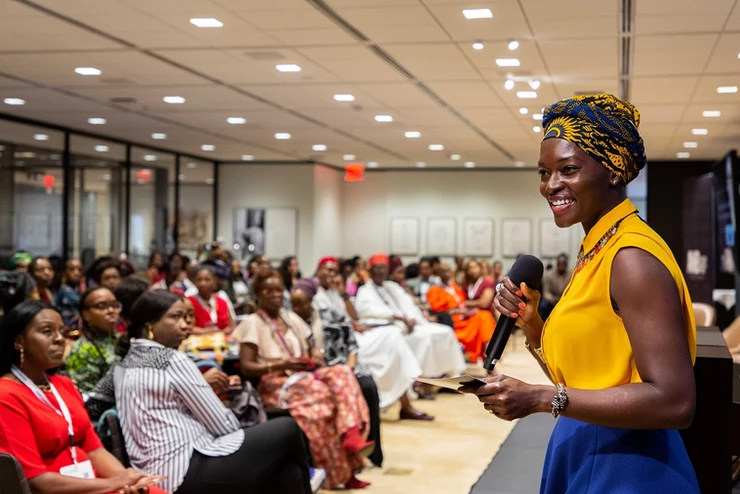Every year at global summits like the WEF, UNGA, and G7, global leaders convene to discuss the most pressing issues of our time, including everything from economic models to climate change.
But as African women, how can these discussions possibly translate into real on-the-ground impact for us and our communities when – more often than not – we are absent from these tables? It is this absence in itself that inspired the creation of African Women on Board.
African Women on Board (AWB) had its global launch (AWB@UNGA) during the week of the United Nations General Assembly (UNGA) in New York. The organisation, of which Dr Balonwu is Founder and Chair, is carrying out a global programme of events, as it amplifies the voices of women and girls of African heritage globally.
Taking place on Thursday 26th September 2019, at the Ford Foundation Centre for Social Justice in New York during the week of the UN General Assembly, AWB@UNGA was keynoted by Executive Vice President of the Ford Foundation, Hilary Pennington, and the Liberian Vice President, who was represented by Ambassador Cooper.
Opening the event, Balonwu told the room full of delegates:
“Today marks the official launch of AWB’s international programming series. And what better stage to launch that on than here in New York, during the UN General Assembly. Every year at global summits like the WEF, UNGA, and G7, global leaders convene to discuss the most pressing issues of our time, including everything from economic models to climate change. But as African women, how can these discussions possibly translate into real on-the-ground impact when – more often than not – we are absent from these tables?”
The event was extremely well attended, and other notable speakers included the CEO of the Nigerian Stock Exchange, the Managing Director of HP Africa, and the UN Women Regional Director for Central and West Africa. The Obi of Onitsha, one of the continent’s most important Monarchs, spoke on culture/tradition being dynamic, to no longer be used as an excuse for hindering the progress of women.
“#MeToo didn’t come to the African continent,” Balonwu told Radio France Internationale (RFI) in an interview at the event. “There were pockets of conversation around #MeToo but nothing that really moved the conversation forward. If you google images of us, you see women carrying things on their heads, five babies on their backs… but when you see America, you see greatness – though perhaps not today.”
“Can women in Africa come out and say, ‘Me Too’? Not only is it possible, they must. This is the whole point of African Women on Board to say to women, ‘you have to speak up for yourself’. We are the ones raising these men, what if we believed in ourselves more?”
AWB focuses on changing narratives and improving realities to fast-track the trajectories of African women in the three key areas of: Women as Leaders, Women as Entrepreneurs, and Women as Consumers.
Already collaborating with Wikipedia to help raise the profile of African women around the world, AWB is also working with a range of other key partners from the social and corporate sectors such as Ford Foundation, Bank of Industry, and the Nigerian Stock Exchange to engage in a series of initiatives that support the empowerment of women and girls of African heritage globally.
For us, AWB@UNGA is not a single event, but the starting point for the work that must be done to achieve AWB’s mission of advancing narratives to improving realities for African women and girls globally. We are excited to have started this global movement and are thrilled to see so many people catching the vision and running with it.
